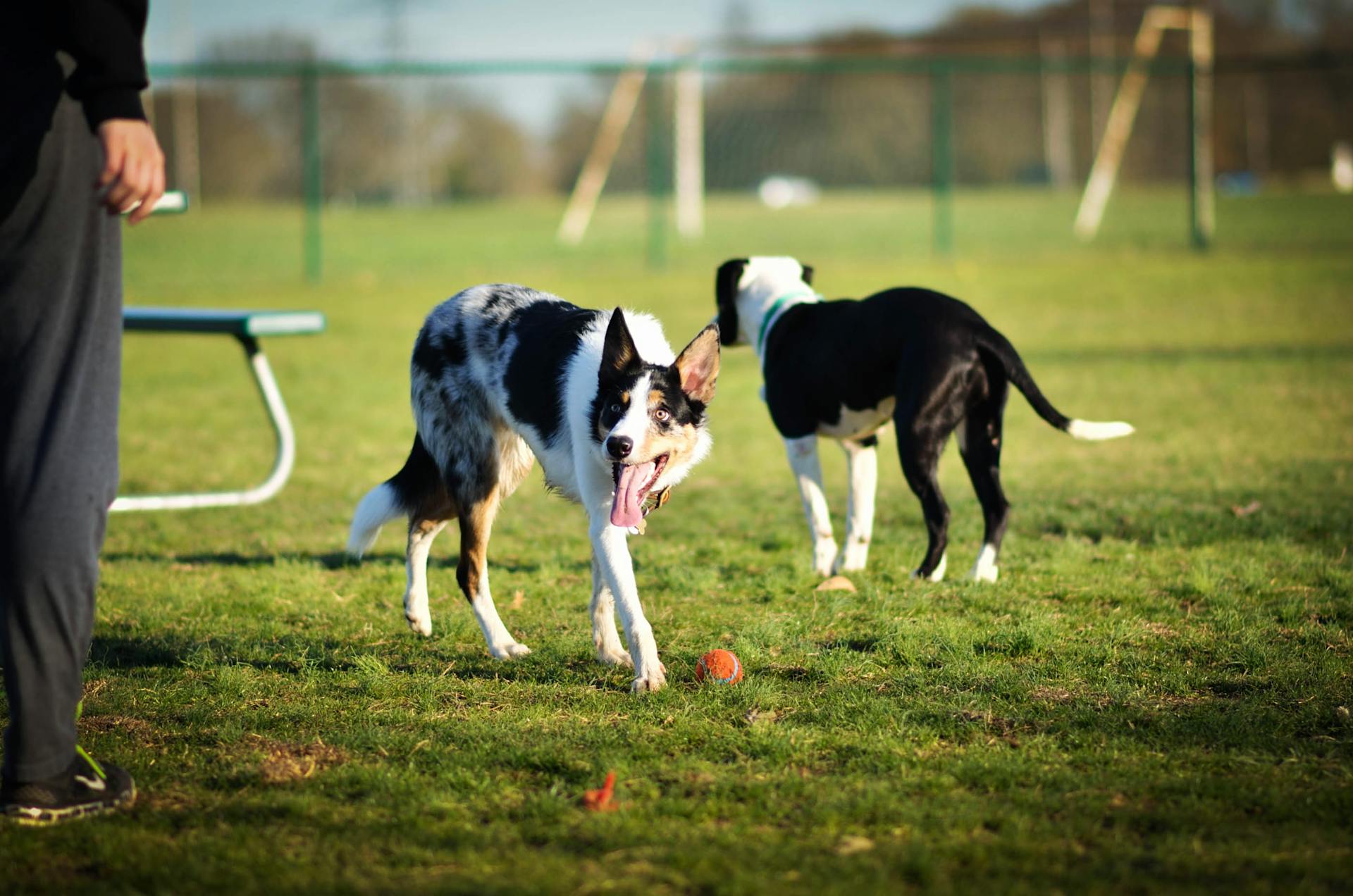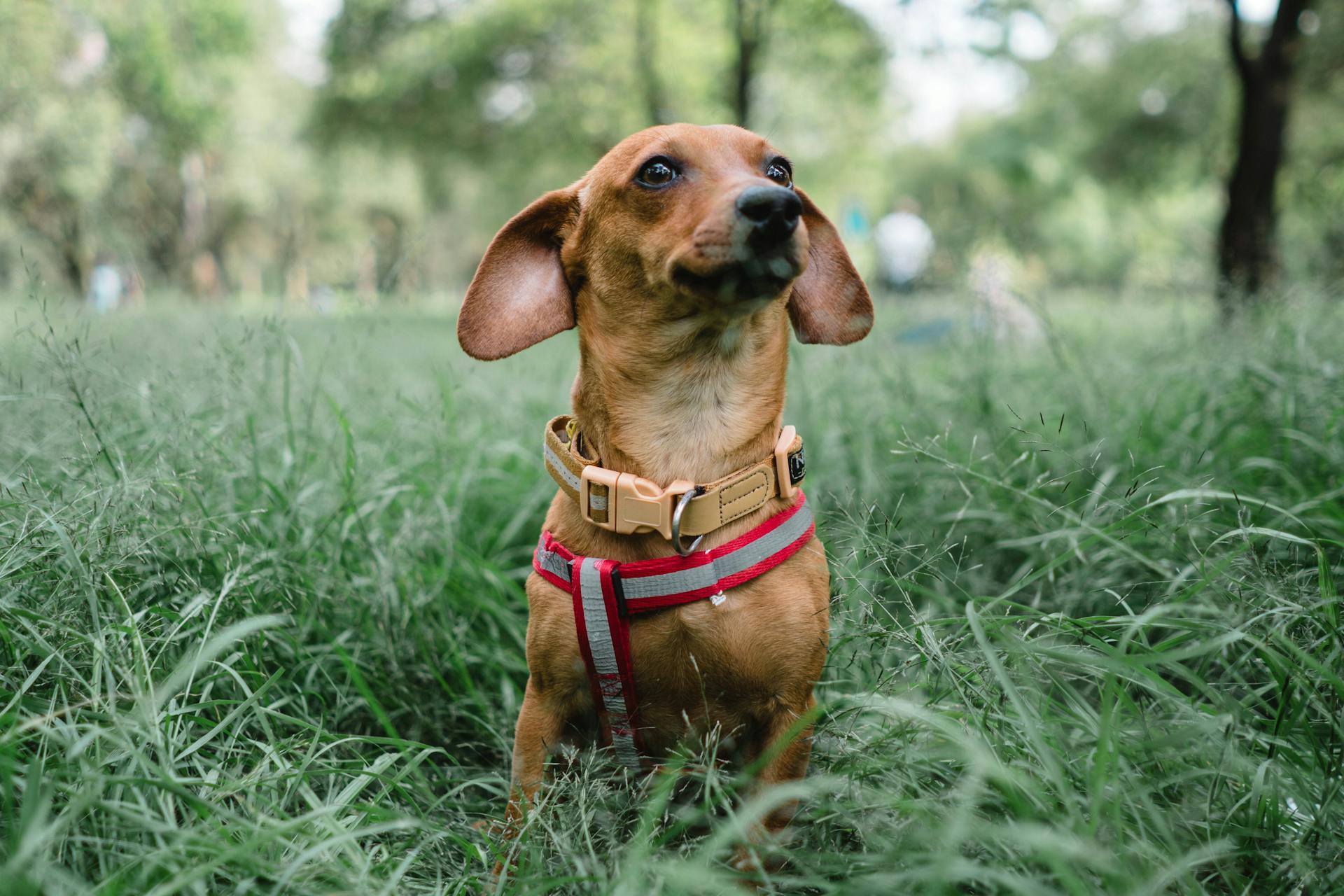
Border Collies are often misunderstood as aggressive dogs, but the truth is, they're actually one of the most intelligent breeds out there.
Their high energy levels and strong herding instincts can sometimes be misinterpreted as aggression. This is especially true if they're not provided with enough physical and mental stimulation.
Border Collies are naturally protective of their family and territory, which can be mistaken for aggression. However, this behavior is a result of their strong pack mentality and desire to care for their loved ones.
With proper training, socialization, and exercise, Border Collies can thrive as loving and loyal companions.
Reasons for Dog Aggression
Despite their reputation as a friendly breed, some Border Collies can become aggressive due to various reasons.
A lack of exercise can lead to frustration, which might manifest as aggressive or destructive behavior in Border Collies. They have high energy levels and need regular physical activity and mental stimulation to stay well-behaved.
Disease can also cause aggression in Border Collies. Dogs are smart enough to recognize that they don't feel right when they're sick, but they can't comprehend the cause of their discomfort, leading to unpredictable and volatile outbursts.
Many of these outbursts are caused by issues with their brain or thyroid, making it essential to monitor your dog's health closely.
Factors Influencing Behavior
A Border Collie's behavior is shaped by a combination of factors, including their training, environment, and genetics. Training plays a paramount role in shaping a Border Collie's demeanor, with socialization, herding control, and positive reinforcement being key components.
A well-trained Border Collie is often obedient, eager to please, and can suppress undesired instincts when guided properly. This is especially important for preventing aggressive behavior, which can be triggered by overly protective or fearful tendencies.
Physical exercise is essential for Border Collies, who can become restless and exhibit destructive or aggressive behavior if they don't get enough physical activity. Regular play, walks, and even agility training can help expend their energy constructively.
A fresh viewpoint: Training Border Collies
Mental stimulation is also crucial for Border Collies, who can become bored and exhibit aggression if they don't receive enough mental challenges. Puzzle toys, obedience training, and activities that challenge their intelligence can help prevent boredom-related aggression.
Here are some key factors to consider when assessing a Border Collie's behavior:
- Socialization: Exposure to diverse environments, people, and other animals from a young age can help prevent overly protective or fearful tendencies.
- Herding Control: Basic obedience training can help manage and channel a Border Collie's herding instincts.
- Physical Exercise: Regular physical activity can help expend a Border Collie's energy and prevent destructive or aggressive behavior.
- Mental Stimulation: Providing mental challenges through puzzle toys, obedience training, and activities that challenge their intelligence can help prevent boredom-related aggression.
Environmental Factors Affecting Behavior
Environmental factors can significantly impact a Border Collie's behavior. A stable environment is crucial for their well-being, as they can become anxious and aggressive in households with tension or inconsistent training.
Border Collies thrive in environments that provide ample physical and mental stimulation. Without sufficient exercise, they can become restless and exhibit destructive or aggressive behavior. Regular play, walks, and agility training can help expend their energy constructively.
Mental stimulation is just as important as physical activity for Border Collies. Puzzle toys, obedience training, and activities that challenge their intelligence can prevent boredom-related aggression. A household with inconsistent training, tension, or lack of stimulation can lead to anxiety in a Border Collie.
A change in circumstances, such as a new family member or moving house, can lower a Border Collie's threshold for reaction and lead to anxiety or aggression. This is due to a process known as stress-induced dishabituation, where a dog becomes anxious in contexts they were previously habituated to.
Here are some key environmental factors to consider when raising a Border Collie:
By understanding and addressing these environmental factors, you can help create a stable and supportive environment for your Border Collie to thrive in.
Caused by Disease
Disease can be a major factor in aggression in dogs, especially in breeds like border collies. A vet check is the first step in identifying any underlying medical issues.
Dogs can recognize they're not feeling right when they're sick, but they can't understand the cause of their discomfort. This can lead to aggression as a result of their illness.
Many cases of aggression caused by disease are related to issues with the brain or thyroid. These conditions can cause severe and sudden outbursts with little warning, making them particularly volatile.
Understanding Aggression
Border Collies are not inherently aggressive, but they can become aggressive due to various reasons. Understanding canine body language is crucial in recognizing the signs of aggression and preventing it.
A dog's body language changes from lip licking, yawning, and nose licking when they first become worried about a particular trigger or situation, through a range of different behaviours until they finally resort to biting. Recognising these signals and taking action to remove the dog from a situation can be extremely helpful in preventing aggression.
Redirected aggression can occur if a dog becomes frustrated but has no outlet upon which to direct their frustration. Situations in which a dog is able to watch other dogs or children passing his house, or if your garden is directly next to a pathway and other dogs and people are passing by frequently are good examples of how aggression could occur if people try to move the dog, or distract it when it is very overexcited or aroused.
For another approach, see: When Do Border Collies Calm down
Some dogs have learned that by being aggressive, they get the attention of their owner, or they are given treats to move them away from a trigger. These dogs may have been aggressive for one of the above reasons initially, but their aggressive behaviour has become so well practised that they are very confident about using it, and do so with very little emotion.
A well-trained Border Collie is often obedient, eager to please, and can suppress undesired instincts when guided properly. Socialization, herding control, and positive reinforcement are key components of training that can help prevent aggressive behavior.
A household with inconsistent training, tension, or lack of stimulation can lead to anxiety in the dog, which can potentially result in aggressive behavior. Border Collies thrive in stable environments, and their herding instincts can be managed and directed through proper training.
Here are some signs of true aggression in a Border Collie:
- Growling
- Baring teeth
- Snapping without herding intent
- Unprovoked attacks
If these behaviors are observed, it's essential to consult with a professional dog trainer or behaviorist.
Managing Aggression
Border Collies are intelligent dogs that need mental stimulation to prevent boredom and frustration, which can lead to destructive behavior.
Regular exercise is essential for their physical and mental well-being, and a lack of physical activity can cause them to become aggressive.
With proper training and exercise, Border Collies can learn to channel their energy and impulses in a positive way.
A daily routine that includes physical activity and mental stimulation can help prevent aggression in Border Collies.
Providing a safe and engaging environment can help reduce the likelihood of aggressive behavior in these dogs.
Worth a look: How Much Exercise Do Border Collies Need
Training and Prevention
Training plays a crucial role in shaping a Border Collie's demeanor. A well-trained Border Collie is often obedient, eager to please, and can suppress undesired instincts when guided properly.
Socialization from a young age is essential. This helps prevent Border Collies from becoming overly protective or fearful, which can trigger aggressive behavior.
Herding control is another important aspect of training. Basic obedience training can help manage and channel their herding instincts, redirecting their focus away from unwanted herding behavior.
Consider reading: Border Collies Herding Ducks
Positive reinforcement techniques are key to successful training. Rewarding desired behavior ensures Border Collies associate good behavior with positive outcomes, making aggression less likely.
To address aggression, address unwanted behaviors promptly. This can be achieved through consistent training and early socialization.
Here are some key takeaways to keep in mind:
- Socialization from a young age helps prevent aggression.
- Basic obedience training can help manage herding instincts.
- Positive reinforcement techniques are essential for successful training.
Frequently Asked Questions
Border Collies can be prone to aggression due to their high energy levels and strong herding instincts, but this can be managed with proper training and socialization.
Border Collies are highly intelligent dogs and require a lot of mental and physical stimulation to prevent boredom and destructive behavior.
With early socialization and training, Border Collies can learn to control their herding instincts and live harmoniously with other pets.
Border Collies are naturally protective of their family and territory, which can sometimes be misinterpreted as aggression.
If you're considering bringing a Border Collie into your family, be prepared to invest time and effort into training and exercise to keep them happy and healthy.
Border Collies are highly trainable and thrive on structure and clear boundaries.
Proper training and socialization can help prevent aggression in Border Collies and make them wonderful family pets.
Suggestion: Border Collies Herding Sheep
Frequently Asked Questions
What are the behavioral issues with Border Collies?
Border Collies can develop behavioral issues like herding children, chewing, and digging if they lack training or mental stimulation. Excessive barking can also occur when they're bored or frustrated, highlighting the need for engaging activities.
Are Border Collies aggressive to strangers?
Border Collies can be naturally wary of strangers and may exhibit protective behaviors, but this is not typically aggression. They may require time and gentle introduction to build trust with new people.
Sources
- https://www.oodlelife.com/are-border-collies-aggressive/
- https://www.askthedogguy.com/border-collie-prey-drive/
- https://collieconsultant.co.uk/2023/06/01/border-collie-suddenly-aggressive/
- https://collieconsultant.co.uk/2023/11/11/border-collie-aggressive-behaviour-what-do-i-do/
- https://iheartdogs.com/are-border-collies-aggressive/
Featured Images: pexels.com


